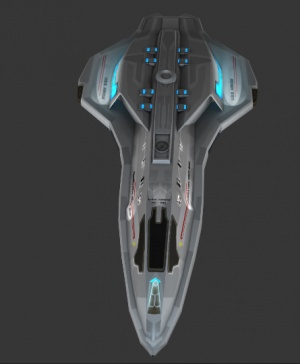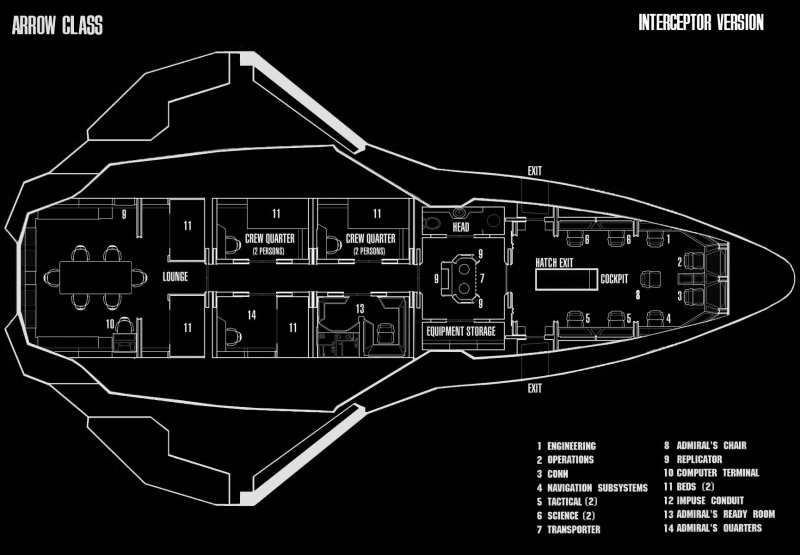Argonaut class: Difference between revisions
No edit summary |
Aigle Phos (talk | contribs) m (Fixing table) |
||
| Line 17: | Line 17: | ||
! Danube Class | ! Danube Class | ||
! Arrow Class | ! Arrow Class | ||
! | ! Argonaut Class | ||
|- | |- | ||
| Length | | Length | ||
| Line 44: | Line 44: | ||
| 2 | | 2 | ||
|- | |- | ||
| colspan=" | | colspan="4" | ''Crew'' | ||
|- | |- | ||
| Minimum | | Minimum | ||
| Line 56: | Line 56: | ||
| 4 | | 4 | ||
|- | |- | ||
| colspan=" | | colspan="4" | ''Weapons'' | ||
|- | |- | ||
| Phaser Emitters | | Phaser Emitters | ||
| Line 68: | Line 68: | ||
| None | | None | ||
|- | |- | ||
| colspan=" | | colspan="4" | ''Defenses'' | ||
|- | |- | ||
| Shields | | Shields | ||
Latest revision as of 22:46, 23 September 2015
| Utopia Planitia Fleet Yards |
|---|
|
SMALL CRAFT Danube •
Arrow •
Argonaut •
Ketch
While the Arrow Class Runabout was designed to use the same modular approach as the Danube Class Runabouts, the Argonaut does not follow in this tradition. Instead the ship designers took a note from the usage of vessels like the Delta Flyer (The first and second iteration of this unique craft) in the sense that while both of those vessels were not modular they both successful completed a range of missions as a complete unit. It was also reasoned that the amount of effort needed to re-purpose a "modular" vessel also defeated the purpose when a timely response was required. Even though, from the outset, the ship designers decided against the modular approach they included the basic shape of the Arrow Class when constructing the Argonaut. Given that politically relations between the major powers has become more tenuous an added objective was when developing the Argonaut. That was that the runabout would be able to complete its varied missions with a maximum of comfort to the personnel aboard (considering that the Argonaut like the Arrow was designed to be able operate independently for extended periods of time over) but also the ability to travel discretely. In the past traveling discretely either meant having a fast warp cruise factor or having the ability to cloak which is a technology still banned to Star Fleet. It was also known that it wasn't possible to include faster warp engines on the Argonaut so another alternative had to be found. What was developed was a nano-polymer infused into the standard Tritanium composite. This new alloy gave the Argonaut the somewhat unique ability to avoid long range and passive sensor scans as it allows the vessel to absorb a certain amount of energy. Argonaut Class Runabouts still remain detectable at close range and constantly visible. This hull material is also thicker then a normal Tritanium hull so the Argonaut Class Runabout does not possess a torpedo launcher. The Cockpit may be used as an Emergency Escape Pod, complete with independent Life Support system, RCS Thrusters and Combat Rations. As shown in the diagrams below, should the need arise for Emergency Egress, the entire warp engine section may be jettisoned, freeing all the Cockpit for independent maneuvering. The one other significant improvement made over the Arrow Class Runabout was minimum crew needed to operate the Argonaut. The Argonaut's systems were streamlined to allow a single person to operate the Argonaut but still provide maximum functionality. In light of this the ship designer's did away with the dedicated CO's seat in the Cockpit of the Argonaut. Similarly there is only one science and tactical stations in the Argonaut's cockpit as apposed to two of each in the Arrow's base design. This was done to maximize space in other sections of the ship.Specification Comparison
Schematics | ||||||||||||||||||||||||||||||||||||||||||||||||||||||||||||
- Black-and-white ship illustrations by Tim Davies unless otherwise noted. Used with permission. All other images are copyright to their respective owners.
- Black-and-white ship illustrations by Tim Davies unless otherwise noted. Used with permission. All other images are copyright to their respective owners.
| REV SD 239209.23 |
|---|




